Introduction
Chapter 1: How Complexity Harms Your Productivity
Chapter 2: The 80/20 Principle
Chapter 3: Build a Minimum Viable Product
Chapter 4: Write Clean and Simple Code
Chapter 5: Premature Optimization is the Root of All Evil
Chapter 6: Flow
Chapter 7: Do One Thing Well And Other Unix Principles
Chapter 8: Less Is More in Design
Chapter 9: Focus
Letter From The Author
The Art of Clean Code
Download Chapter 2: THE 80/20 PRINCIPLE
Look Inside!
Most software developers waste thousands of hours working with overly complex code. The eight core principles in The Art of Clean Code will teach you how to write clear, maintainable code without compromising functionality. The book’s guiding principle is simplicity: reduce and simplify, then reinvest energy in the important parts to save you countless hours and ease the often onerous task of code maintenance.
Bestselling author Christian Mayer leverages his experience helping thousands perfect their coding skills in this new book. With expert advice and real-world examples, he’ll show you how to:
- Concentrate on the important stuff with the 80/20 principle — focus on the 20% of your code that matters most
- Avoid coding in isolation: create a minimum viable product to get early feedback
- Write code cleanly and simply to eliminate clutter
- Avoid premature optimization that risks over-complicating code
- Balance your goals, capacity, and feedback to achieve the productive state of Flow
- Apply the Do One Thing Well philosophy to vastly improve functionality
- Design efficient user interfaces with the Less is More principle
- Tie your new skills together into one unifying principle: Focus
This Python-based guide is suitable for programmers at any level, with ideas presented in a language-agnostic manner.
"An excellent book packed full of insights that every programmer (and project manager) should know."
—Tim Cox, Author of Raspberry Pi Cookbook for Python Programmers
"An extremely readable book . . . Readers of this book will likely come away as believers in a more minimalistic mindset. Moreover, the book lives up to its title. The lessons taught can be applied not only in coding but also toward making the reader’s life generally more productive and successful."
—Lee Teschler, Microcontroller Tips
"A great source to learn about the basic principles of clean code and best practices to get better at coding . . . Reading this book saves you time and teaches valuable skills, so go for it!"
—Crow Intelligence
"I very much enjoyed [The Art of Clean Code], and definitely would recommend it to anybody, not just programmers or related, but anybody, as it does apply to nearly everyone, if they can think outside the box!"
—Lukas Batema, Founder of BatemaDevelopment







